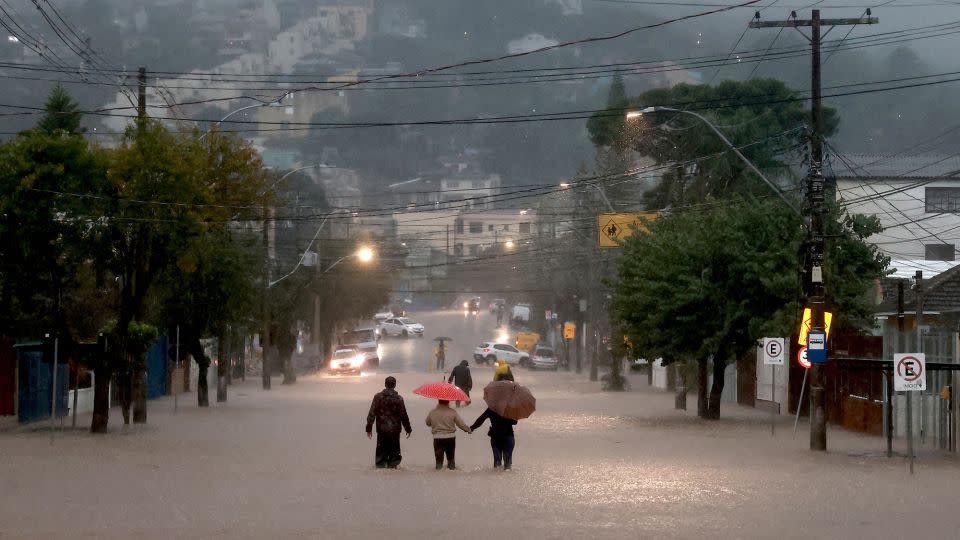The planet has just reached a “shocking” new milestone, enduring 12 consecutive months of unprecedented heat, according to new data from Copernicus, the European Union’s climate monitoring service.
Every month from June 2023 to May 2024 was the hottest month on record worldwide, Copernicus data showed.
The 12-month heatwave was “shocking but not surprising” given man-made climate change, said Carlo Buontempo, director of Copernicus, who warned of worse to come. Unless pollution from planet-warming fossil fuels is reduced, “this series of warmer months will be remembered as comparatively cool,” he said.
Copernicus released its data on the same day that United Nations Secretary-General António Guterres gave an impassioned speech in New York about climate change, criticizing fossil fuel companies as the “godfathers of climate chaos” and, for the first time, explicitly calling on all countries to ban advertising of their fossil fuel products.
Guterres called on world leaders to quickly take control of the spiraling climate crisis or face dangerous tipping points. “We are playing Russian roulette with our planet,” he said Wednesday. “We need a freeway exit ramp into climate hell.”
As temperatures rise, global climate commitments are “hanging by a thread”, he warned.
Copernicus data showed that every month since July 2023 has been at least 1.5 degrees warmer than temperatures before industrialization, when humans began burning large amounts of planet-warming fossil fuels.
The global average temperature over the past 12 months was 1.63 degrees above pre-industrial levels.
Under the Paris Agreement in 2015, countries agreed to limit global warming to 1.5 degrees above pre-industrial levels. Although this target refers to warming over decades, not a single month or year, scientists say this breach is an alarming sign.
“This is a harbinger of increasingly dangerous climate impacts on the horizon,” said Richard Allan, professor of climate at the University of Reading in the United Kingdom.
The news comes as the western US is experiencing its first heat wave this summer, with temperatures soaring into the triple digits. But the unprecedented heat has already left a trail of death and destruction across the planet this spring.
Dozens died in India in recent weeks as temperatures reached 50 degrees Celsius (122 Fahrenheit); brutal temperatures in Southeast Asia have caused deaths, school closures and wilting crops; and as the heat increased in Mexico, howler monkeys fell dead of the trees.
Warmer air and oceans also fuel more intense rainfall and destructive storms like those that hit the U.S, Brazil, Kenya and the United Arab Emiratesamong other nations this year.
The recent heat offers “a window into the future with extreme heat that challenges the limits of human survivability,” said Ben Clarke, a researcher at the Grantham Institute at Imperial College London. “It is vital that people understand that every tenth of a degree of warming exposes more people to dangerous and potentially deadly heat,” he told CNN.



“Extreme events driven by climate chaos are accumulating, destroying lives, shaking economies and harming health,” said Gutteres.
Humanity is having an outsized impact on the world, he said, comparing it to the meteor that began the process of wiping out the dinosaurs 66 million years ago.
“In the case of climate, we are not dinosaurs,” said Guterres. “We are the meteor. We are not just in danger. We are the danger.”
An even hotter future
Global temperatures are expected to begin falling below record levels in the coming months as El Niño – a natural climate phenomenon that tends to increase the planet’s average temperature – weakens.
But that won’t mean an end to the long-term trend of rising temperatures as humans continue to burn planet-warming fossil fuels. “Although this streak of record months will eventually be interrupted, the general signature of climate change remains and there are no signs in sight of a change in this trend,” Buontempo said.
Guterres’ speech also made reference to new data released by the World Meteorological Organization, which concluded that there is almost an 86% probability that at least one of the years between 2024 and 2028 will break the record for the hottest year, set in 2023.
The WMO also calculated a nearly 50% probability that global average temperatures over the entire five-year period between 2024 and 2028 would be more than 1.5 degrees above pre-industrial levels. This would bring the world closer to exceeding the long-term 1.5-degree limit that is at the heart of the Paris Agreement.


Guterres firmly placed the blame for the climate crisis on fossil fuel companies that “make record profits and enjoy billions in taxpayer-funded subsidies,” he said.
These companies have spent billions of dollars over decades “distorting the truth, misleading the public and sowing doubt,” he added. He called on all countries to ban advertising for fossil fuels, similar to advertising bans implemented around the world for other products that harm human health, such as tobacco.
“We are at a moment of truth,” he said, adding that the battle for a habitable planet would be won or lost this decade.
He called on world leaders to take immediate action, including huge cuts in planet-warming pollution and an immediate end to any new coal projects. He pressed rich countries to commit to abandoning coal by 2030, reducing oil and gas by 60% by 2035, and increasing the flow of finance to the poorest and most climate-vulnerable nations.
“We cannot accept a future where the rich are protected in air-conditioned bubbles, while the rest of humanity is buffeted by lethal weather conditions in uninhabitable lands,” Guterres said.
For more news and newsletters from CNN, create an account at CNN.com













/cdn.vox-cdn.com/uploads/chorus_asset/file/25521968/Affinity_six_month_free_trial.jpg?w=300&resize=300,300&ssl=1)




















